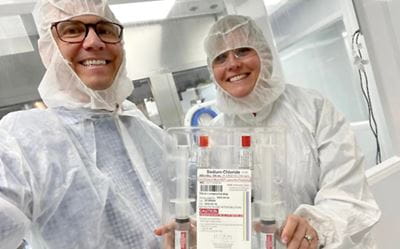When Laura Bray’s 9-year-old daughter was battling acute lymphoblastic leukemia in 2019, the family was told the hospital couldn’t supply Erwinaze — a chemotherapy drug essential to her daughter’s survival.
Abby asked her mom, “What’s going to happen now? Will I die without my medicine?”
Bray spent 10 heart-wrenching days and nights trying to find the drug. After what seemed like thousands of calls to hospitals, pharmacies, lawmakers, and manufacturers, she found it.
But Abby faced two more drug shortages during her treatment, and Bray knew she wasn’t the only family facing this fight.
The experience sparked Bray to start Angels for Change, a nonprofit dedicated to solving the drug shortage crisis.
Fast forward to today, and Angels for Change is making a real impact thanks to Project PROTECT.
Project Protect proactively addresses drug shortages by forging partnerships with medicine manufacturers to ensure drugs are always available to patients who depend on them.
“We’ve proved that identifying vulnerable drugs and working with manufacturers to do the work ahead of time is the solution,” Bray said.
Building a resilient supply chain
In 2018, drug shortages lasted one year. Today, shortages can last as long as four years.
But Project PROTECT makes sure medicines at risk of shortage are available for a three-year period. Grant funds are provided to select 503B manufacturers that compound sterile drugs for hospitals and health care institutions. With a growing number of limitations due to single-source dependencies, quality assurance, and drug complexity, this effort helps stabilize the supply of critical drugs.
“For those three years, the manufacturers get to say that they are the protector of that medicine for the U.S.,” Bray said. “Even if it doesn’t go short, they still get the value of feeling great about doing something important for all patients.”
Collaborating for change
Four years ago, Bray received a call that sodium chloride and potassium chloride, essential when caring for premature newborns and young babies, were going into shortage.
Terri Lyle Wilson, vice president of pharmacy services at Children’s Hospital Association, was on the other end of the hotline.
Wilson had a solution, but it would cost $100,000.
At the time, Angels for Change had just hosted its first gala. The nonprofit had the funds, and Bray was ready to put them to use.

sodium chloride.
Angels for Change accepted applications from drug manufacturers willing to prepare to respond to the anticipated shortage. The dollars were granted to STAQ Pharma and covered half of the manufacturer’s expenses for formulation development, stability testing, initial manufacturing, and launch of the drugs. Bray and Wilson worked with STAQ Pharma to expedite availability and alleviate hospital concerns that the medicine might not be available.
Production started in February. By the end of April, sodium chloride and potassium chloride had gone into shortage.
STAQ Pharma was the only supplier ready to address the crisis. The manufacturer distributed 20,675 units to meet hospitals’ needs.
“This was the creation of a trusted ecosystem that allows hospitals to adjust appropriately because we had supply ready,” Bray said. “It led to nearly 700,000 patients, mostly NICU babies, getting care.”
A lifeline for families
Since its first pilot for sodium chloride and potassium chloride in 2021, Project PROTECT has expanded to ensure the availability of nine medicines. The initiative’s advisory board uses the U.S. Pharmacopeia medicine supply map and prediction technology to identify lifesaving pediatric drugs at risk of shortage.
The work is crucial since nearly 50% of essential pediatric medications were in shortage in 2023, and children’s hospitals routinely face at least 25% more shortages than general facilities.
Angels for Change remains committed to resolving supply issues earlier in the process so caregivers may never have to put families in the unthinkable position Bray found herself in six years ago.
“I represent Abby as our first patient, but I represent all the hundreds and thousands of patients before and after,” Bray said. “I won’t stop until there are no families calling about drug shortages.”


